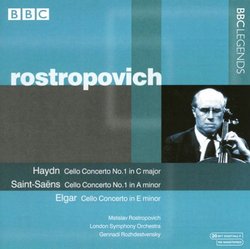| All Artists: Edward Elgar, Franz Joseph Haydn, Camille Saint-Saens, Gennady Rozhdestvensky, Mstislav Rostropovich, London Symphony Orchestra Title: Haydn, Saint-SaŽns, Elgar: Cello Concertos Members Wishing: 0 Total Copies: 0 Label: BBC Legends Original Release Date: 1/1/2006 Re-Release Date: 10/17/2006 Genre: Classical Styles: Chamber Music, Forms & Genres, Concertos, Historical Periods, Classical (c.1770-1830), Instruments, Strings Number of Discs: 1 SwapaCD Credits: 1 UPC: 684911419825 |
Search - Edward Elgar, Franz Joseph Haydn, Camille Saint-Saens :: Haydn, Saint-SaŽns, Elgar: Cello Concertos
 | Edward Elgar, Franz Joseph Haydn, Camille Saint-Saens Haydn, Saint-SaŽns, Elgar: Cello Concertos Genre: Classical
|
Larger Image |
CD Details |
CD ReviewsHis cello was his sword! Hiram Gomez Pardo | Valencia, Venezuela | 05/02/2007 (5 out of 5 stars) " With the recent departure of Rostropovich, literally ends a cycle that began in 1927. Mitislav was presential witness of countless livings, fears and anguishes. His cello was his sword through the world, and nobody was capable to dissuade him around the reach of his goal. How can we do without of Shostakovich without thinking of him? Both artists were narrowly near, and that fruitful friendship was fertile and productive. You may also think about in Bartok and Gyorgy Sandor or Benjamin Britten and Sviatoslav Richter, for instance, but the personal attitude of these this colossus of the cello can not be imagined without Sviatoslav Richter and David Oistrakh. The world becomes orphan, smaller, more miserable and perhaps more lonely when a musician of such stature decides to leave without permission. These recordings are fundamental part of a recent story that still deserves to be told. I really hope his son Maxim and his grandson Dimitri write a book about the countless and unsaid anecdotes about the man and the artist. His double feature as performer and conductor deserved him the best praises all around the world. His contributions around the promotion and performing of so many Russian composers, his proved humanity, his friendly support, even in the most awful circumstances conform a period of six decades. I just only hope this little note serves to remind with profound sadness the enormous legacy and historical transcendence of his musical bequeath. . . Go on, and far beyond the graves (Goethe) " Rostropovich is the (one and only) star here Santa Fe Listener | Santa Fe, NM USA | 03/18/2007 (5 out of 5 stars) "Buyers need to be advised that these three live performances, all conducted carelessly by Rozhdestventsky, are in boxy mono that could be mistaken for a much older recording than 1965. the London Sym. doesn't cover itself in glory, either, which leaves the spotlight completely on Rostropovich. Fortunately, he is at his magnificent best. The program, aslisted by The Gramophone, is as follows:
Elgar Concerto for Cello and Orchestra,Op. 85. Haydn Concerto for Cello and Orchestra No 1,HobVIIb/1. Saint-Saëns Concerto for Cello and Orchestra No 1,Op. 33. The key work is the Elgar, for two reasons: Rostropovich is treading on ground made sacred by Jaqueline Du Pre, and he never recorded the work commercially. As a one-off it's mesmerizing, fully the equal of Du Pre's two passionate, free-wheeling accounts (her readings were so incandescent that most cellists after her tend to underplay the work so as not to suffer by comparison). Both of Du Pre's conductors, Sir John Barbirolli and husband Daniel Barenboim, are more secure in Elgar's idiom than the feeble Rozhdestvensky, who seems lost most of the time, letting Rostropovich take the lead. Even if the Elgar is your reason for buying this CD, attention must be paid to the other two works. Rostropovich made at least two commercial recordings of the Haydn, and this live reading duplicates the reckless virtuosity he displayed on them. The Saint-Saens is given a blistering preformance that quite redeems the work, making it seem twice as good as it really is. There's no helping the draggy slow movement, but whenever Rostropovich returns to the rhapsodic main theme that recurs in the fast movements, he digs in and tosses off the rapid passagework as if its difficulty meant nothing. In sum, three great performances in which Rostropovich carries everything on his shoulders. " |

 Track Listings (10) - Disc #1
Track Listings (10) - Disc #1